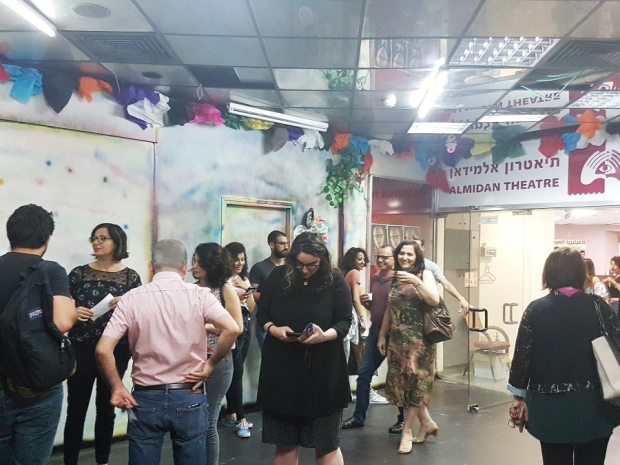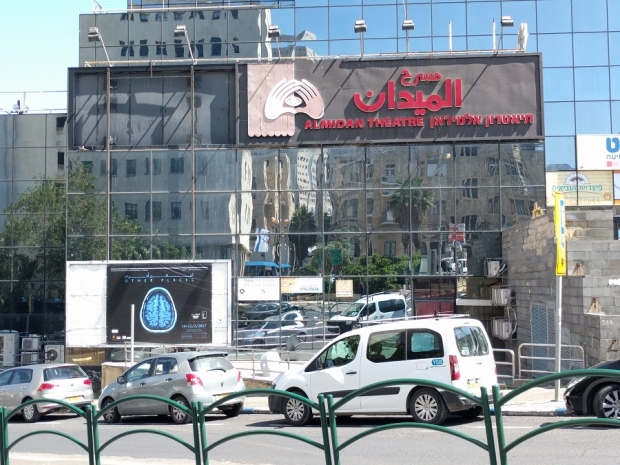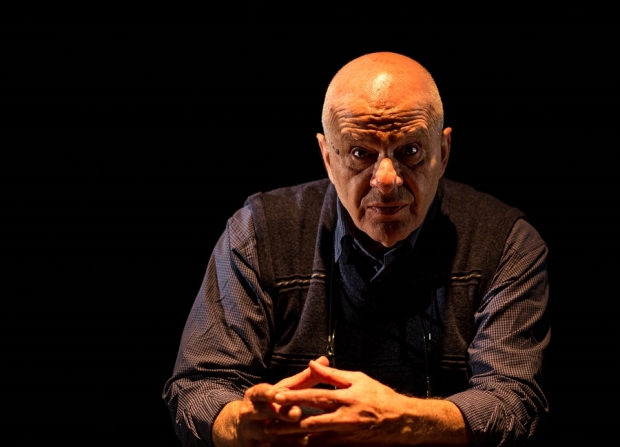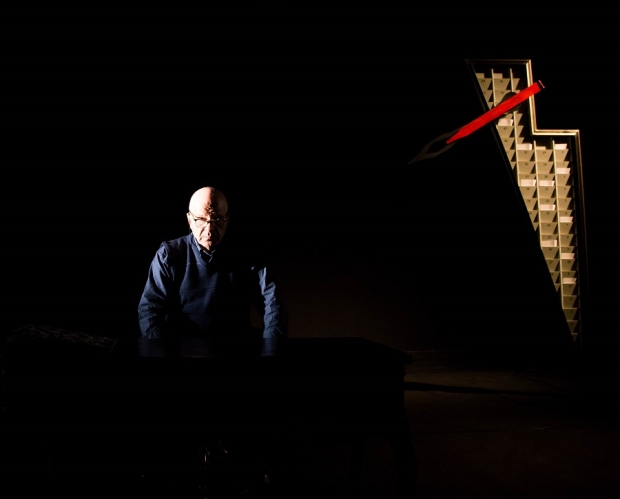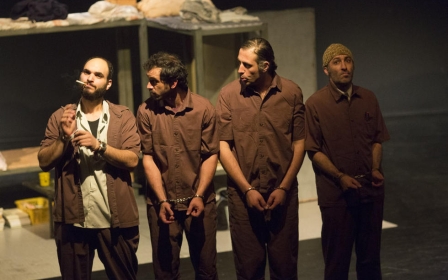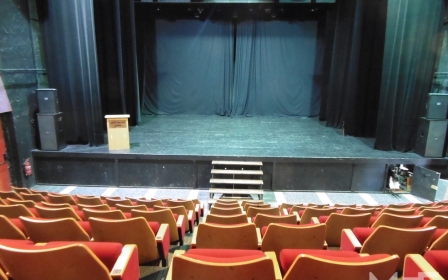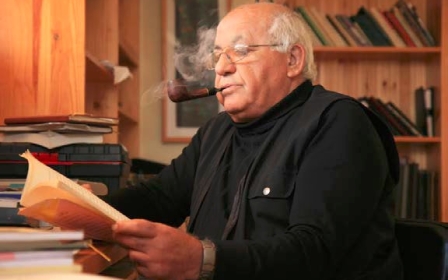'Our people will open Al-Midan': Theatre refuses to die in face of Israeli funding axe
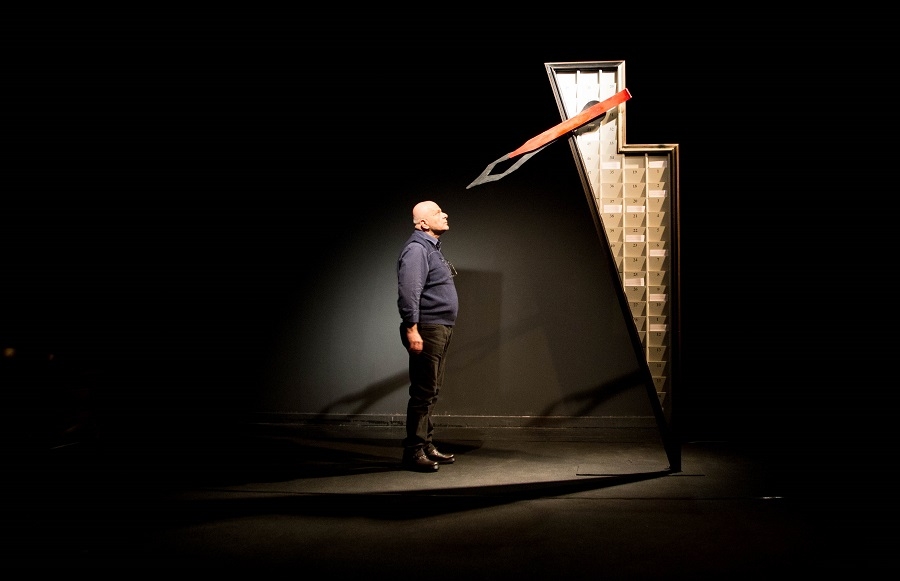
HAIFA, Israel - It was the first time in weeks the doors of the popular Arabic-language theatre in Haifa, Al-Midan, opened to the public. Al-Midan - which means "the square" in Arabic - has been closed for the past two months due to a strike against the Israeli government for withholding the theatre's funds.
'The state will not limit our artistic freedom'
- Rafat Amne Jamal
More than one hundred Palestinian citizens of Israel crowded the small entrance hall last week, waiting to watch the play Walking On the Wind, based on a book by Palestinian novelist Salman Natour.
The event was part of a campaign hash-tagged شعبنا_يفتح_الميدان# (Our People Will Open Al-Midan), meant to help the striking theatre keep its head above water. The play was the first of four cultural events, all performed voluntarily by Arab actors and comedians to help raise funds to keep the theatre open to the public.
The atmosphere was one of defiance and solidarity. “It was important for me to come here and support our theatre, to say clearly – the state will not limit our artistic freedom,” said Rafat Amne Jamal, one of the attendees.
Critics say the Ministry of Culture’s withholding of the theatre’s funds is a political assault, and is a continuation of its previous 2015 attempt to defund the theatre after it put on a play about Palestinian prisoners.
“It's money that we deserve, that Al-Midan and Palestinian art inside Israel deserve. It's not a donation or favour from Israel, it's our right as taxpayers," he added.
'We haven’t paid our workers since the beginning of the year - everyone you see working around you today is volunteering'
- Amer Hlehel, artistic director of Al-Midan theatre
According to the theatre’s management, Israel is withholding 2.2m shekels ($608,000), which are the theatre’s funds for 2016 and 2017. As a result, the theatre is sinking under a debt of 750,000 shekels ($207,000). Additionally, it was forced to begin striking and halt all artistic productions in March.
“We haven’t paid our workers since the beginning of the year, everyone you see working around you today is volunteering,” Amer Hlehel, the theatre's artistic director told MEE at the event, adding: “We can’t keep it up like this for long. There’s rent to pay for the halls, a big debt, salaries… we might be forced to shut the theatre down completely.”
In a statement in March, Israel's Ministry of Culture said that the funds were being held because of “the theatre’s small scope of activity in 2016”.
Helhel acknowledged that the theatre was required to showcase 100 plays during 2016 but, as a result of the first funding freeze in 2015, it only showed 45, adding that the move was actually politically motivated.
“We had no money to work on plays," Helhel said.
Only we can tell our story
Al-Midan's community is mainly made up of Palestinian citizens of Israel that acquired Israeli citizenship after the 1948 Nakba (The Catastrophe), when Palestinians were expelled from their lands and the state of Israel was founded.
Before the play started, Hlehel tried to deliver a welcome speech to the audience. Lacking a microphone, he had to shout over the people’s chatter to gain their attention. "We can’t hear you! Repeat!’ a voice said from the crowd.
'It’s not an act of protest or an artistic choice, but a necessity brought on by the fund-freeze'
- Amer Hlehel, artistic director of Al-Midan theatre
“This is part of the situation we are in,” Hlehel said, with his charismatic voice finally reaching everyone’s ears as they turned silent. “The fact that there’s no microphone, no proper lighting here… it’s not an act of protest or an artistic choice, but a necessity brought on by the fund freeze.
“It was important for us to come here and make sure that our people are with us, and that we are with our people. We can only rely on our community to support us, not on the Minister of Culture Miri Regev, or anyone else,” he added.
As people were leaving the theatre, Mari explained that things are not the way the Ministry of Culture wants to portray. “The Ministry of Culture wants to hear us say that we are living in happiness and ‘co-existence’ in Israel and that everything is okay, but everything is not okay.”
“Like we saw in the play today, our story is different: it deals with our Nakba, our occupation, our dual reality of being both Palestinians and citizens of Israel. Jewish-Israelis can’t tell us how to write it, only we can feel it and tell it,” he said.
"If the theatre won’t be artistically autonomous, then I don’t consider it to be a theatre. In that case, I am prepared to close it,” Helhel, said, receiving loud and bitter-sweet applause from the crowd.
Political persecution
After the play, Hlehel talked to MEE about the history of the feud between the theatre and the state. According to him, it is “continued governmental harassment against the theatre’s art, headed by Minister of Culture Miri Regev."
“It all started in 2015. Our funds were first frozen then, after we aired a play called A Parallel Time," he said.
'Our story is different: it deals with our Nakba, our occupation, our dual reality of being both Palestinians and citizens of Israel. Jewish-Israelis can’t tell us how to write it'
- Salim Mari, activist
The play was inspired by the story of Walid Daka, a former fighter for the Popular Front for the Liberation of Palestine (PFLP), who was implicated in the abduction and later killing of Israeli soldier, Moshe Tamam, in 1984. Daka has been serving a life sentence ever since.
The theatre petitioned the high court against the freeze, and the two sides eventually negotiated the dispute out of court by signing a settlement. According to the settlement, the theatre would withdraw its petition, and its funds for 2016 and 2017 were to be reinstated.
“Despite signing the agreement, the Ministry of Culture won’t honour it. It froze our funds again for a second time earlier this year,” Hlehel said.
"Our settlement agreement clearly stated that the state will not be able to punish us in case we fail to match future criteria because of the first fund freeze," he added.
Helhel also argued that working to close a cultural institution was not how the ministry should treat theatres struggling to meet their quota. "You can’t deal with a cultural institution by working to close it. You should work to solve the problem, understand why it happened, fix it. We asked them to give us a small portion of the money, just so we aren’t forced to shut the theatre down, but they said no,” Hlehel said. “We were given a totally opposite treatment than any other institutions."
“We know the real reason behind this is political persecution. Miri Regev herself openly said it many times. She doesn’t want to give us money for political reasons. She wants us to close the theatre," he added.
'We can only rely on our community to support us, not on the Minister of Culture Miri Regev, or anyone else'
- Amer Hlehel, artistic director of Al-Midan theatre
In an interview in an Israeli radio station two months ago, Regev called Al-Midan “a political, subversive theatre working against the state of Israel”.
“No sane country would fund bodies that undermine it and justify the murder of its soldiers,” she said, in response to a statement by Hlehel who said he considers Daka a security prisoner, not a terrorist.
Hlehel told MEE that the theatre’s crisis not only hurts the workers, but the entire Palestinian community that regularly frequents the theatre.
“We are hopeful the campaign will manage to re-open Al-Midan and keep it from closing, but we can never be certain. The difficult political climate in this place is too unstable, and who knows what will happen tomorrow?" he added.
Middle East Eye propose une couverture et une analyse indépendantes et incomparables du Moyen-Orient, de l’Afrique du Nord et d’autres régions du monde. Pour en savoir plus sur la reprise de ce contenu et les frais qui s’appliquent, veuillez remplir ce formulaire [en anglais]. Pour en savoir plus sur MEE, cliquez ici [en anglais].


